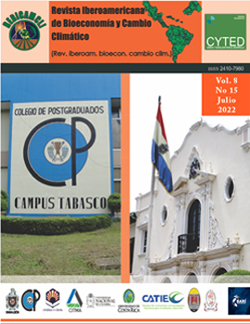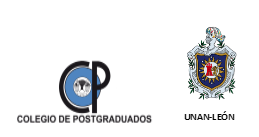Epistemology of Bioeconomy
DOI:
https://doi.org/10.5377/ribcc.v8i15.13986Keywords:
Biomass, Bio-base economic, Thermodynamic, Entropy, Bioeconomic modelAbstract
This research focused on studying (“logos”) the foundations and methods of scientific knowledge (“episteme”) of the Bioeconomy. The methodology of the epistemological approach was used, which explores the internal coherence of the reasoning that leads to the creation of knowledge, the usefulness of its methodologies taking into account its objectives, the historical contexts in which these discernment segments appeared, and the way in which that influenced its elaboration, and the limitations and uses of certain forms of research and of certain concepts, among other things. The results of the literature review show that the residual biomass (microbial, plant, or animal) of a potential technological reconfiguration of the bioeconomy is Christianizing research, innovation, and technology. In this transformation, the academy plays a fundamental role with its researchers, technicians, and laboratory specialists who in an innovative way (exosomatically) use residual biomass to generate environmentally friendly products and services, keeping efficiency intact with a socially useful product ( low entropy).
Downloads
381
HTML (Español (España)) 0
References
Allain, S., Ruault, J. F., Moraine, M., & Madelrieux, S. (2022). The 'bioeconomics vs bioeconomy'debate: Beyond criticism, advancing research fronts. Environmental Innovation and Societal Transitions, 42, 58-73.
https://doi.org/10.1016/j.eist.2021.11.004
Afriat, S.N. (1972), "Efficiency Estimation of Production Functions", International Economic Review, 13, 568-598.
https://doi.org/10.2307/2525845
Blanco-Orozco, N. V., Arce-Díaz, E., & Zúñiga-Gonzáles, C. (2015). Evaluación integral financiera, económica, social, ambiental y de productividad del uso de bagazo de caña y combustibles fósiles para la generación de energía eléctrica en Nicaragua. Revista Tecnología En Marcha, 28(4), pág. 94-107. https://doi.org/10.18845/tm.v28i4.2447
https://doi.org/10.18845/tm.v28i4.2447
Boles, J.N. (1966), "Efficiency Squared - Efficient Computation of Efficiency Proceedings of the 39th Annual Meeting of the Western Farm Economic Association, pp 137-142.
Colon-García, A. P., Catari-Yujra, G., & Alvarado, E. (2021). Los senderos productivos de la bioeconomía: El caso Honduras. Rev. Iberoam. Bioecon. Cambio Clim., 7(14), 1713-1726. https://doi.org/10.5377/ribcc.v7i14.12820
https://doi.org/10.5377/ribcc.v7i14.12820
Coelli, T. (1996). A guide to DEAP version 2.1: a data envelopment analysis (computer) program. Centre for Efficiency and Productivity Analysis, University of New England, Australia, 96(08), 1-49.
Colmenares Quintero, J. C. (2019). Bioeconomía circular: retos y oportunidades. Video). Universidad Cooperativa de Colombia. Recuperado de: http://hdl. handle. net/20.500, 12494, 14259.
Córdova, R. R. (2002). Economía y recursos naturales (Vol. 34). Univ. Autònoma de Barcelona.
Carvajal-Rodríguez J.C., Sol-Sánchez A., Zuniga-González C.A., Zenteno-Ruiz C.E., SierraFigueredo P., Núñez-Rodríguez J. De J., Marinero-Orantes E.A, Acevedo J.C., DuranZarobozo O, Guzmán-Moreno M.A, Colon-García P.A, Baqueros F., (2021). Libro de Resúmenes: Tercer Congreso Iberoamericano de Bioeconomía y Cambio Climático. Universidad de Santander UDES, Colombia-Universidad Nacional Autónoma de Nicaragua, León. Nicaragua. 50 págs. ISSN: 2745-195X (En línea)
Charnes, A., W.W. Cooper and E. Rhodes (1978), "Measuring the Efficiency of European Journal of Operations Research, 2, 429-444.
https://doi.org/10.1016/0377-2217(78)90138-8
Dios-Palomares, R., Lopez de Pablo, D. A., Diz Pérez, J., Jurado Bello, M., Guijarro, A. P., Martinez-Paz, J. M., & Zúniga González, C. A. (2015). Aspectos medioambientales en los análisis de eficiencia. Rev. Iberoam. Bioecon. Cambio Clim., 1(1), 88-95. https://doi.org/10.5377/ribcc.v1i1.2143
Domínguez, J., Vega, J., Rodríguez, F., & Espitia, S. (2020). La economía verde en el desarrollo empresarial del siglo xxi. Revista de Investigación Transdisciplinaria En Educación, Empresa y Sociedad, 1(2), 78-120.
https://doi.org/10.5377/ribcc.v1i1.2143
de Jaramillo, E. H. (2018). Bioeconomía: el futuro sostenible. Revista de la Academia Colombiana de Ciencias Exactas, Físicas y Naturales, 42(164), 188-201.
https://doi.org/10.18257/raccefyn.650
Einstein, A. (1988). La teoría de la relatividad. Editorial Ercilla.
EU COMMISSION (2007): En route to the Knowledge-based Bio-economy, Bruselas, European Commission, 1-23l.
EU COMMISSION (2010): The Knowledge-based bio-economy (KBBE) in Europe: achievements and challenges, Bruselas, Flemish Government 1-68l.
Farrell, M.J. (1957), "The Measurement of Productive Efficiency", Journal of the Royal Statistical Society, A CXX, Part 3, 253-290.
https://doi.org/10.2307/2343100
Georgescu-Roegen, Nicholas. (1935). Fixed coefficients of production and the marginal productivity theory. Review of Economic Studies 3, no. 1 (October): 40-49.
https://doi.org/10.2307/2967570
Georgescu-Roegen, Nicholas (1966). Analytical Economics: Issues and Problems. Cambridge: Harvard University Press.
https://doi.org/10.4159/harvard.9780674281639
Georgescu-Roegen, Nicholas. (1971). The Entropy Law and the Economic Process. Cambridge: Harvard University Press.
https://doi.org/10.4159/harvard.9780674281653
Georgescu-Roegen, Nicholas. (1972). Comment of Adelman's review. Journal of Economic Literature 10, no. 4 (December): 1268.
Georgescu-Roegen, Nicholas. (1975). Energy and economic myths. Southern Economic Journal 41, no. 3 (January): 347-381.
https://doi.org/10.2307/1056148
Georgescu-Roegen, Nicholas. (1977)a. The steady state and ecological salvation: A thermodynamic analysis. Bioscience 27, no. 4 (April): 266-270.
https://doi.org/10.2307/1297702
Georgescu-Roegen, Nicholas. (1977)b. Letter to the Editor. Bioscience 27, no. 12 (December): 771.
https://doi.org/10.1093/bioscience/27.12.771-b
Georgescu-Roegen, Nicholas. (1976). Energy and Economic Myths: Institutional and Analytical Economic Essays. Pergamon Press. Nueva York, 1976, p. 236.
Georgescu-Roegen, Nicholas. (1979). Energy analysis and economic valuation. Southern Economic Journal 45, no. 4 (April): 1023-1058.
https://doi.org/10.2307/1056953
Georgescu-Roegen, Nicholas. (1988). An emigrant from a developing country: Autobiographical notes - 1.
https://doi.org/10.1007/978-1-349-09776-0_4
Georgescu-Roegen, N. (2003). Bioeconomia. Bollati Borinchieri.
Georgescu-Roegen, N., Naredo, J. M., & Grinevald, J. (1996). La ley de la entropía y el proceso económico (No. BOOK). Madrid: Fundación Argentaria.
Georgescu-Roegen, N. (2017). Bioeconomía: una nueva mirada a la naturaleza de la actividad económica. Revista de Economía Crítica, (23), 152-168.
German Bioeconomy Council (2015). Making Bioeconomy Work for Sustainable Development. Communiqué of the Global Bioeconomy Summit 2015, Berlin, November 26th.
Hernández Cervantes, Tania. (2008). Breve exposición de las contribuciones de Georgescu Roegen a la economía ecológica y un comentario crítico. Argumentos (México, D.F.), 21(56), 35-52. Recuperado en 06 de diciembre de 2021, de http://www.scielo.org.mx/scielo.php?script=sci_arttext&pid=S0187-57952008000100003&lng=es&tlng=es.
Hernández, R. E., & Céspedes, J. (2020). Bioeconomía: una estrategia de sostenibilidad en la cuarta revolución industrial. Revista de Investigación e Innovación Agropecuaria y de Recursos Naturales, 7(2), 126-133.
Henry, G., Pahun, J., & Trigo, E. (2014). La Bioeconomía en América Latina: oportunidades de desarrollo e implicaciones de política e investigación. Faces, 20(42-43), 125-141.
Knowler, D. (2002). A review of selected bioeconomic models with environmental influences in fisheries. Journal of Bioeconomics, 4(2), 163-181.
https://doi.org/10.1023/A:1021151809501
Korostelkina, I., Dedkova, E., & Korostelkin, M. (2021, June). Green Economy: Current Trends and Financial Aspects of Development. In International Conference on Comprehensible Science (pp. 195-206). Springer, Cham.
https://doi.org/10.1007/978-3-030-85799-8_17
Lovell, C.A.K. (1993), "Production Frontiers and Productive Efficiency", in Fried, H.O., C.A.K. Lovell and S.S. Schmidt (Eds), The Measurement of Productive Efficiency, Oxford University Press, New York, 3-67.
López-González, A. S., Zuniga-González, C. A., Sol-Sánchez, Á., & Santiváñez-Galarza, J. L. (2016). Teorías del desarrollo sustentable para el siglo XXI: un breve análisis. Revista Iberoamericana de Bioeconomia y Cambio Climático, 2(1), 437-451.
https://doi.org/10.5377/ribcc.v2i1.5710
López-González, Álvaro S., Zúniga-González, C. A., López, M. R., Quirós-Madrigal, O. J., Colón-García, A. P., Navas-Calderón, J., Martínez-Andrades, E., & Rangel-Cura, R. A. (2016). Estado del arte de la medición de la productividad y la eficiencia técnica en América Latina: Caso Nicaragua. Rev. Iberoam. Bioecon. Cambio Clim., 1(2), 76-100. https://doi.org/10.5377/ribcc.v1i2.2478
Maldonado, C. (2014). Biodesarrollo y complejidad. Propuesta de un modelo teórico. Un viaje por las alternativas al desarrollo: perspectivas y propuestas teóricas, 71-95.
Mayumi, K. (2001). The origins of ecological economics: the bioeconomics of Georgescu-Roegen. Routledge.
https://doi.org/10.4324/SE0502
Mohammadian, M. (2005). La bioeconomía: Un nuevo paradigma socioeconómico para el siglo XXI. Encuentros multidisciplinares. nº 19 Enero-Abril 2005.
Marx, Karl (2000). Grundrisse, vol 1, Siglo XXI Editores, México, 2000, p. 12.
OCDE (2006): Scoping document: The bioeconomy to 2030: Designing a policy agenda, París, OCDE, 382-286l.
OCDE (2009): The Bioeconomy to 2030: Designing a policy agenda, París, OCDE, 1-18l.
O'Neill, L., Rauner, M., Heidenberger, K., & Kraus, M. (2008). A cross-national comparison and taxonomy of DEA-based hospital efficiency studies. Socio-Economic Planning Sciences, 42(3), 158-189.
https://doi.org/10.1016/j.seps.2007.03.001
Ormeño, M., & Ovalle, A. D. R. I. Á. N. (2007). Preparación y aplicación de abonos orgánicos. INIA Divulga, 10, 29-34.
Olivo, M. D. L., Martín, A., Sáez Sáez, V., & Soto Olivo, A. (2010). Vulnerabilidad al incremento del nivel del mar. Medio socioeconómico: área Cabo Codera-Laguna de Tacarigua, estado Miranda, Venezuela. Terra, 26(39), 59-75.
Pacheco, P. R., Mera, E. M., & Salini, G. A. (2019). Medición localizada de contaminantes atmosféricos y variables meteorológicas: segunda Ley de la termodinámica. Información tecnológica, 30(3), 105-116.
https://doi.org/10.4067/S0718-07642019000300105
Passet, René (1979). l'économique et le vivant, Petites éditions Payot, 1979
Passet, René (2012). La bioéconomie, un monde à réinventer. Ecologie politique, (2), 83-91.
https://doi.org/10.3917/ecopo.045.0083
Pyka, A., Cardellini, G., van Meijl, H., & Verkerk, P. J. (2022). Modelling the bioeconomy: Emerging approaches to address policy needs. Journal of Cleaner Production, 330, 129801.
https://doi.org/10.1016/j.jclepro.2021.129801
Robles, E. A. (2021). Crecimiento de la productividad total de los factores en Costa Rica e inestabilidad macroeconómica. Revista de Ciencias Económicas, 39(1), 1-24.
https://doi.org/10.15517/rce.v39i1.47622
Rodríguez, A. G., Rodrigues, M.y Sotomayor, O., (2019). "Hacia una bioeconomía sostenible en América Latina y el Caribe: elementos para una visión regional", serie Recursos Naturales y Desarrollo, N° 191 (LC/TS.2019/25), Santiago, Comisión Económica para América Latina y el Caribe (CEPAL), 2019.
Reynolds, J. F., Maestre, F. T., Huber-Sannwald, E., Herrick, J., & Kemp, P. R. (2005). Aspectos socioeconómicos y biofísicos de la desertificación. Ecosistemas, 14(3).
Ramírez García, I. (2017). La Bioeconomía y el cambio climático. MUUCH' XÍIMBAL CAMINEMOS JUNTOS, (5), 145-155. https://doi.org/10.26457/mxcj.v0i5.2273
Rangel Cura, R. A., Zúniga González, C. A., Colón García, A. P., Losilla Solano, L., & Berrios-Zepeda, R. A. (2015). Medición de la contribución de la bioeconomía en América Latina: caso Cuba. Rev. Iberoam. Bioecon. Cambio Clim., 1(1), 223-240. https://doi.org/10.5377/ribcc.v1i1.2150
Skegg, D., Gluckman, P., Boulton, G., Hackmann, H., Karim, S. S. A., Piot, P., & Woopen, C. (2021). Future scenarios for the COVID-19 pandemic. The Lancet, 397(10276), 777-778.
https://doi.org/10.1016/S0140-6736(21)00424-4
Sánchez, J. I. P., & Alonso, A. A. (2017). Bioeconomía¿ una opción para transitar hacia la economía verde en América Latina?. Administración y Organizaciones, 19(37), 17-34.
Seiford, L.M. and R.M. Thrall (1990), "Recent Developments in DEA: The Mathematical Approach to Frontier Analysis", Journal of Econometrics, 46, 7- 38.
https://doi.org/10.1016/0304-4076(90)90045-U
Vargas-Hernández, J. G., Pallagst, K., & Hammer, P. (2018). Bio economía en la encrucijada del desarrollo sostenible. Revista Iberoamericana de Bioeconomía y Cambio Climático e-ISSN 2410-7980, 4(7), 800-815.
https://doi.org/10.5377/ribcc.v4i7.5952
Tan, R. R., Aviso, K. B., Bandyopadhyay, S., Foo, D. C., & Klemeš, J. J. (2022). Circular economy meets the drawdown economy: Enhanced weathering of industrial solid waste as a win-win solution. Resources, Conservation and Recycling, 178, 106029.
https://doi.org/10.1016/j.resconrec.2021.106029
Vargas-Hernández, J. G., Pallagst, K., & Hammer, P. (2018). Bio economía en la encrucijada del desarrollo sostenible. Rev. Iberoam. Bioecon. Cambio Clim., 4(7), 800-815. https://doi.org/10.5377/ribcc.v4i7.5952
https://doi.org/10.5377/ribcc.v4i7.5952
Waldby, C. y Cooper, M. (2010): "From reproductive work to regenerative labour", Feminist Theory, 11, pp. 3-22.
https://doi.org/10.1177/1464700109355210
Zúniga-González, C. A., Durán Zarabozo, O., Dios Palomares, R., Sol Sánchez, A., Guzman Moreno, M. A., Quiros, O., & Montoya Gaviria, G. D. J. (2014). Estado del arte de la bioeconomía y el cambio climático (No. 1133-2016-92457, pp. 20-329). ISBN 978-99924-28-40-5 https://doi.org/10.22004/ag.econ.168356
Zúniga-Gonzalez, C. A. "The role of the mediator and the student in the face of new educational scenarios: COVID-19." Revista Electrónica Calidad En La Educación Superior 12.2 (2021): 279-294.
https://doi.org/10.22458/caes.v12i2.3730
Zhen, Z., Malik, M. Z., Khan, A., Ali, N., Malik, S., & Bilal, M. (2021). Environmental impacts of hazardous waste, and management strategies to reconcile circular economy and eco-sustainability. Science of The Total Environment, 150856.
Published
How to Cite
License
Copyright (c) 2022 Rev. iberoam. bioecon. cambio clim.

This work is licensed under a Creative Commons Attribution-NonCommercial-ShareAlike 4.0 International License.
Copyright © Rev. iberoam. bioecon. climate change (Graduate School and UNAN-León, School of Agricultural and Veterinary Sciences / Department of Agroecology / Center for Research in Bioeconomy and Climate Cahnge (CRByCC).







